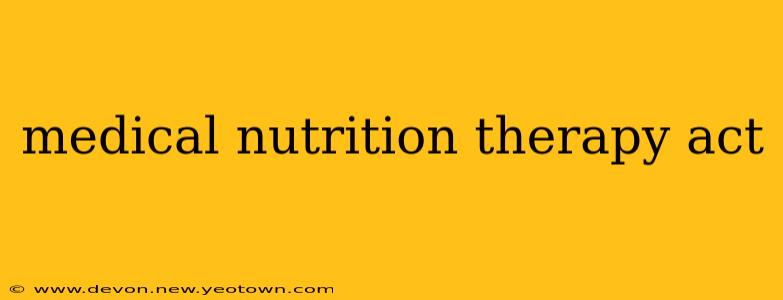The fight for better healthcare access is a long and winding road, paved with advocacy, research, and the unwavering dedication of professionals who understand the vital role they play in improving patient outcomes. One such battle focuses on the Medical Nutrition Therapy (MNT) Act, a piece of legislation aiming to expand access to registered dietitian services. This isn't just about paperwork; it's about real people, facing real health challenges, and how ensuring access to MNT can dramatically improve their lives. Let's delve into the story of this crucial act and why it matters so much.
My name is Sarah Miller, and I've spent the last 15 years working as a Registered Dietitian, witnessing firsthand the transformative power of MNT. I've seen patients struggle with chronic diseases like diabetes, heart disease, and kidney failure, and I've seen how personalized nutrition plans can significantly improve their management of these conditions. But I’ve also seen the frustrating barriers that prevent many patients from accessing the care they desperately need. This is where the MNT Act comes in.
What is the Medical Nutrition Therapy (MNT) Act?
The MNT Act is a proposed bill designed to increase access to medical nutrition therapy (MNT) services covered by Medicare and other health insurance plans. Currently, access is limited, often dependent on the specific condition and the insurance provider's policies. This means many individuals who could benefit from the personalized guidance of a Registered Dietitian are unable to afford or obtain this crucial care. The act aims to change that by standardizing coverage and removing unnecessary obstacles.
Why is Access to MNT Important?
MNT isn't simply about giving dietary advice; it's a critical component of comprehensive healthcare. It involves personalized plans tailored to the individual’s specific needs, medical history, and lifestyle. Here's why access is so crucial:
-
Improved Disease Management: For chronic conditions like diabetes, heart disease, and kidney disease, MNT plays a crucial role in controlling symptoms, preventing complications, and improving overall health. A Registered Dietitian can help individuals understand how their diet affects their condition and create a sustainable eating plan.
-
Reduced Healthcare Costs: While it might seem counterintuitive, investing in MNT can actually reduce overall healthcare costs. By helping individuals manage their conditions effectively, MNT can prevent costly hospitalizations, emergency room visits, and other complications down the line.
-
Improved Patient Outcomes: Countless studies have demonstrated the positive impact of MNT on patient outcomes. From weight management to improved blood sugar control, the benefits are far-reaching and impactful.
What are the Benefits of the MNT Act?
The MNT Act seeks to achieve several key goals:
-
Standardized Coverage: The act aims to ensure consistent coverage for MNT services across all Medicare and other insurance plans. This removes the uncertainty and frustration that patients often face when trying to access care.
-
Increased Accessibility: By removing financial barriers, the act aims to make MNT available to a broader population, especially those with chronic conditions who would benefit the most.
-
Better Health Outcomes: With increased access to MNT, the overall health outcomes for many patients are expected to improve significantly, leading to healthier lives and a reduced burden on the healthcare system.
How Will the MNT Act Help Specific Patient Populations?
This is where the real impact of the MNT Act is evident. Consider these examples:
Diabetes: A well-structured MNT plan is essential for managing diabetes. The Act would help ensure that diabetics have the access to the ongoing support they need to manage their blood sugars and avoid complications.
Heart Disease: Similar to diabetes, heart disease management often relies heavily on dietary changes. The MNT Act aims to make the support of a Registered Dietitian readily available for those with cardiovascular concerns.
Kidney Disease: Dietary restrictions are often crucial for those with kidney disease. The act intends to make the expertise of Registered Dietitians easily accessible, helping to improve patients' quality of life.
What Obstacles Remain in Passing the MNT Act?
While the benefits are clear, the path to passing the MNT Act is not without its challenges. Funding is always a primary concern, as well as navigating complex legislative processes. Education and advocacy are essential to garnering sufficient support to pass this vital legislation.
How Can I Support the MNT Act?
Advocating for patients' rights to access essential healthcare services is a collective effort. Here’s how you can contribute to the progress of the MNT Act:
-
Contact your elected officials: Let your representatives know how important the MNT Act is to you and your community.
-
Join advocacy groups: Several organizations champion the cause of MNT access. Their websites often provide information on how to get involved and support their initiatives.
-
Spread awareness: Talk to others about the importance of MNT and the benefits of the MNT Act.
The Medical Nutrition Therapy Act is not just another piece of legislation; it's a beacon of hope for millions who could benefit from personalized nutrition care. By understanding its implications and actively supporting its passage, we can collectively work towards a healthier future for all. The fight continues, and your voice matters.

